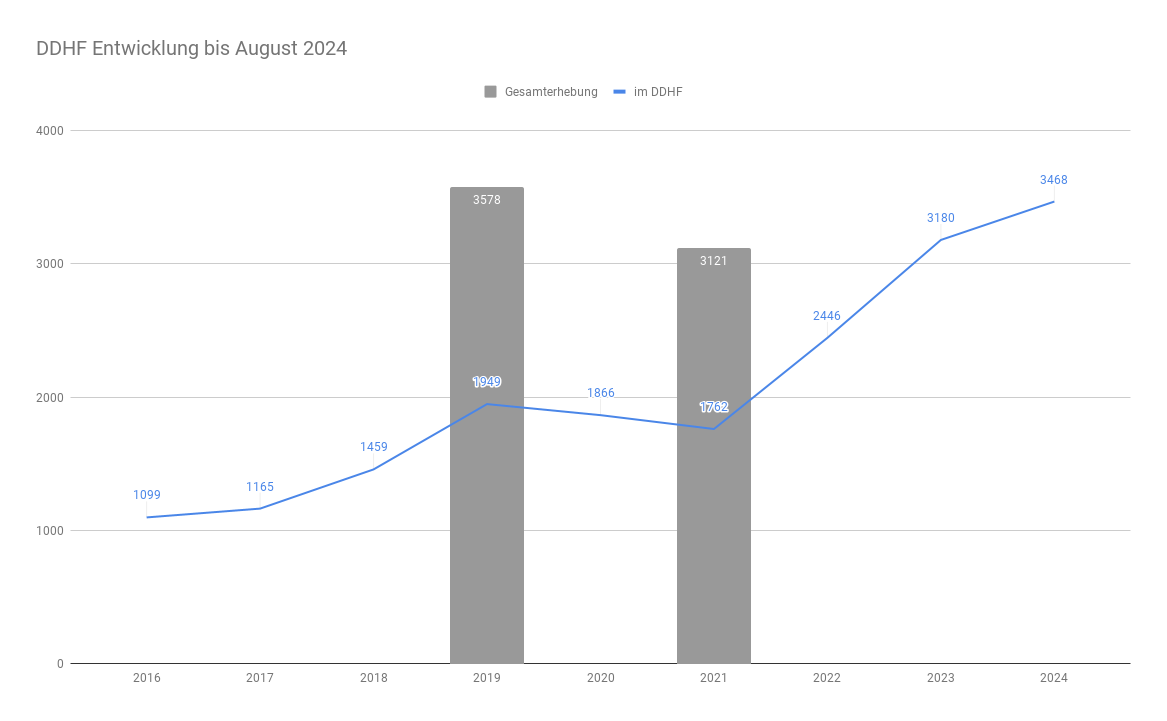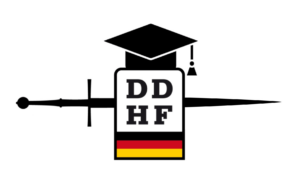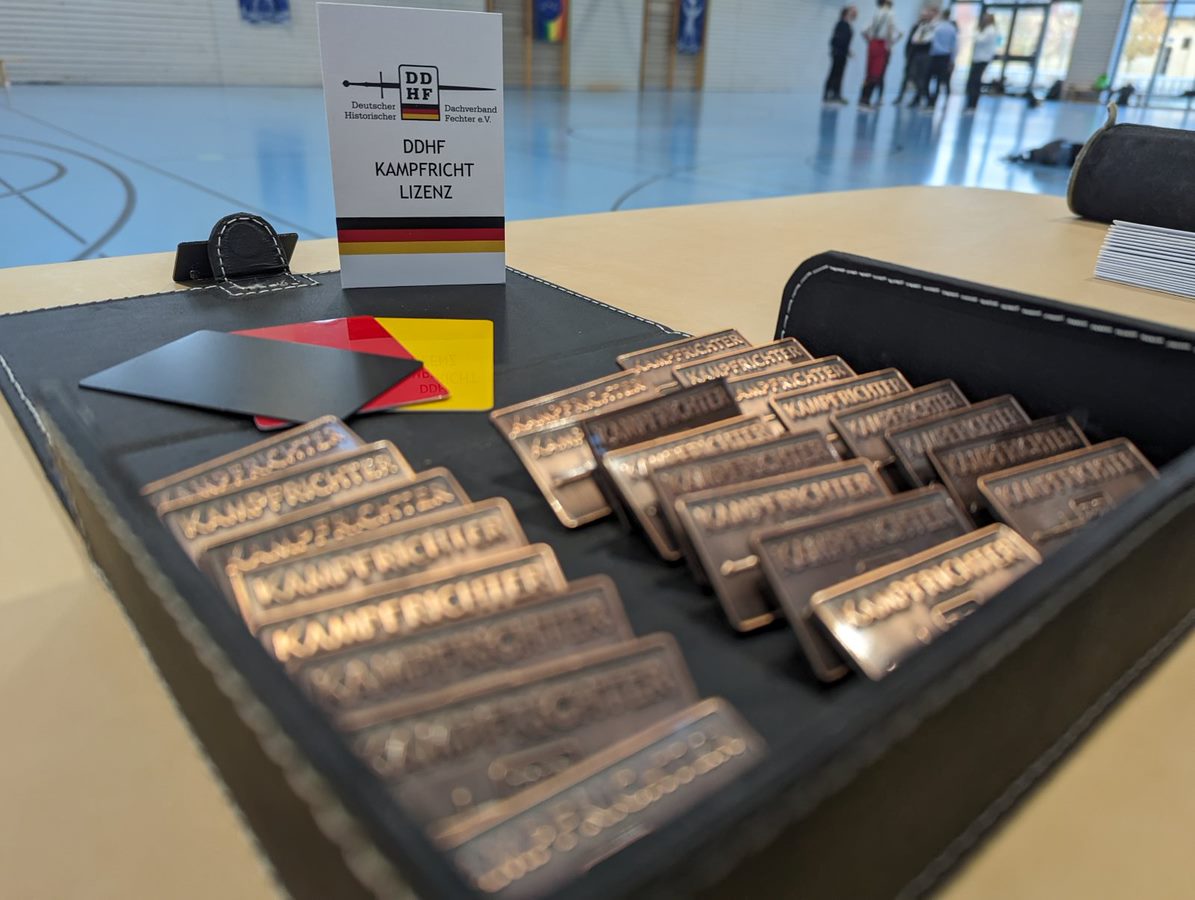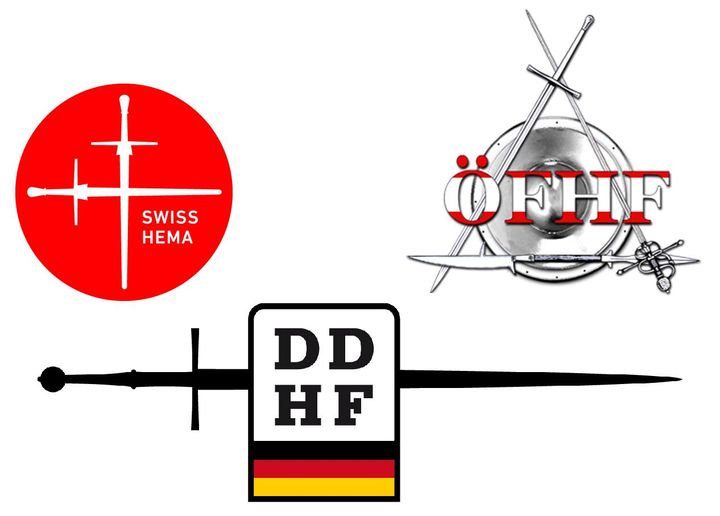
This page is intended to give all fencers and researchers in the international area of the hema community a brief insight into our work and its goals. For further information or collaberation you can contact us here.
About the German Federation for Historical Fencing
The German Federation for Historical Fencing (DDHF) is an umbrella organisation with the aim of cultivating and disseminating the historical European martial arts in order to maintain and promote this extensive cultural heritage. The federation also represents its members at both national and international level and ensures a reputable public image as a sport and field of research.
Sport and Research
The DDHF has expressly included the promotion of research as a second equal purpose alongside sport in its statutes. The reason for this is that the disciplines of historical fencing are forgotten martial arts that need to be reconstructed using surviving fencing books and manuscripts. By linking historical and linguistic research on historical fencing topics with practical knowledge of a living fencing scene, the federation wants to achieve better results in the interpretation of old sources. This link is currently being established with our education platform, where regular online meetings are organised with professional researchers from universities, further education for members are provided and data preservation is maintained.
Tasks and objectives of the federation
The purpose of the DDHF is the cultivation and promotion of historical fencing. Historical fencing is defined as follows:
"Historical fencing is concerned with the reconstruction, close to the source, of European martial arts whose tradition was interrupted or weakened and for which there is a scientifically usable source situation. These include in particular arts whose sources were published before 1918."
Statutes of the DDHF 2014
The tasks of the federation include:
- the dissemination of historical fencing as a sport and cultural asset in theory and practice;
- the development and promotion of concepts for the further development of historical fencing;
- the scheduled training and further education of coaches, trainers, instructors, judges and officials and the development of training standards;
- the representation of historical fencing in the common interest of the members;
- the promotion of a positive public perception of historical fencing;
- the promotion of organised sporting activities;
- the involvement and participation in national and international sporting activities and the organisation of corresponding sporting events.
Facts and figures
The DDHF was founded on 21 June 2014 in Melsungen and is based in Kassel. In August 2024, the non-profit federation comprised 89 member groups with 3468 fencers in 108 locations across Germany. The size of the member groups - predominantly registered clubs, but also commercial schools and interest groups - ranges from under ten to over three hundred fencers. More than half of all HEMA groups and at least 70% of all HEMA fencers in Germany are represented in the DDHF. The locations of the DDHF groups can be viewed here.

There was a slight decline in individual members between 2019 and 2021. During this period, two HEMA census surveys showed that the DDHF represented around 55% of all fencers in Germany. Today's DDHF membership figures include more hist. fencers than were surveyed in 2021. This overall development, but also the growth in membership of the federation, shows once again that interest and enthusiasm for historical fencing is constantly growing. We believe that the efforts of the DDHF play a supporting role in this and that they have contributed to the positive development and growing interest in historical fencing in Germany.
It is encouraging to see how joint efforts and co-operation within the community are bearing fruit and strengthening the tradition of historical fencing.
The growth in the federation's membership 2023 is due on the one hand to the new members since the beginning of 2022 - 22 new fencing groups - but also to a huge increase of 432 individual members within the older member groups.
In 2024, overall growth fell slightly to around 9%, which is not due to a reduction in new members, but to a higher loss of members than usual. The most likely explanation for this is the growth in 2023, which also results in a higher departure rate in 2024.
Information about our league

Many ranking tournaments are held in Germany every year, where you can collect points to climb up the national rankings.
In Germany, we have a framework rulesets that regulates many basic things and several smaller core rulesets. These smaller sets of rules bring a certain amount of variety to the sport, so that athletes cannot focus their training on one set of rules, but should train the art as a whole. The diversity of rules also better reflects the historical complexity of the various contexts. We are also working on completely new ideas such as group combat tournament systems that allow tournaments for Montante/ Schlachtschwert and do justice to the historical sources. Core rulesets that adhere to historical models should also serve this purpose. Most of our rulesets are translated in english, you can read them here.
Foreigners may participate in such ranking tournaments. However, points will only be awarded to athletes who belong to a member group of the DDHF. These tournaments are also more contested and the fighting is a little more fierce.
The DDHF national team is selected from the fencers with the highest points. To be selected, you also need a German passport OR a main residence in Germany.
Ranking lists will be kept in 2024 for the weapon categories longsword, rapier, sabre and sidesword. Ranking lists can be watched here.
There is not automatically a national team for each weapon category, currently there is a national team for longsword and rapier, which organises training camps twice a year, since 2019. We are interested in exchanging ideas with other national teams with regard to joint training sessions or small competitions.
Information about the working groups
Sports Confederation Working Group (AG DOSB)
The AG DOSB deals with all issues related to membership in the German Olympic Sports Confederation (DOSB). We aim to compile information on the advantages and disadvantages of membership, the prerequisites we would need to meet, and the questions we have regarding membership with the DOSB. When a decision is made, it should be well-informed. It is part of the AG's task to inform the members as best as possible. If our federation decides to proceed, this working group will initiate and formulate goals. The "how" also needs to be discussed, as there are multiple conceivable paths.
Equality Working Group (AG Gleichstellung)
We serve as contacts for clubs, schools, and fencers who have questions about topics related to equality. We create various informational materials, guides, and templates (e.g., a guide for setting up an awareness team or a template for a code of conduct) that you can download and use in your fencing groups.
Education Working Group (AG Trainingsleitung)
This working group developed and manages the educational platform. They are also working on setting up a team of teachers and developing training modules that will form the basis of the DDHF's coach training program.
Tournament Working Group (AG Turnier)
The Tournament Working Group deals with all matters related to competitive activities within the DDHF:
Development of new regulations and tournament concepts Participation and voting rights in the sports committee regarding rule changes, approval of regulations, and tournament matters.
About our HEMA politics
As an umbrella organization in Germany, we want to unite HEMA (Historical European Martial Arts) with one voice in order to be perceived and taken seriously by other organizations and sports. At the same time, every member is free to practice HEMA in their own way, because we as an federation support the free development of methods and knowledge of historical martial arts. What we do, however, is to set a positive example, raise awareness of important topics and offer support for individual development. To exert a positive influence and attract more members, we organize events, create guidelines and infrastructrue for education and networking. In doing so, we strive to strike a balance between research and education on one hand, and competition-oriented sports on the other. These are all offerings. No one is obligated to take advantage of them, nor do we insist on holding their own events, tournaments, etc.
Despite different approaches, be it in the practice of the martial art itself or the different ways of leading a group, financially motivated or non-profit, it is important to act as a community and to represent the values we have achieved. Our community is worth protecting, a wonderful place for sport and science.



